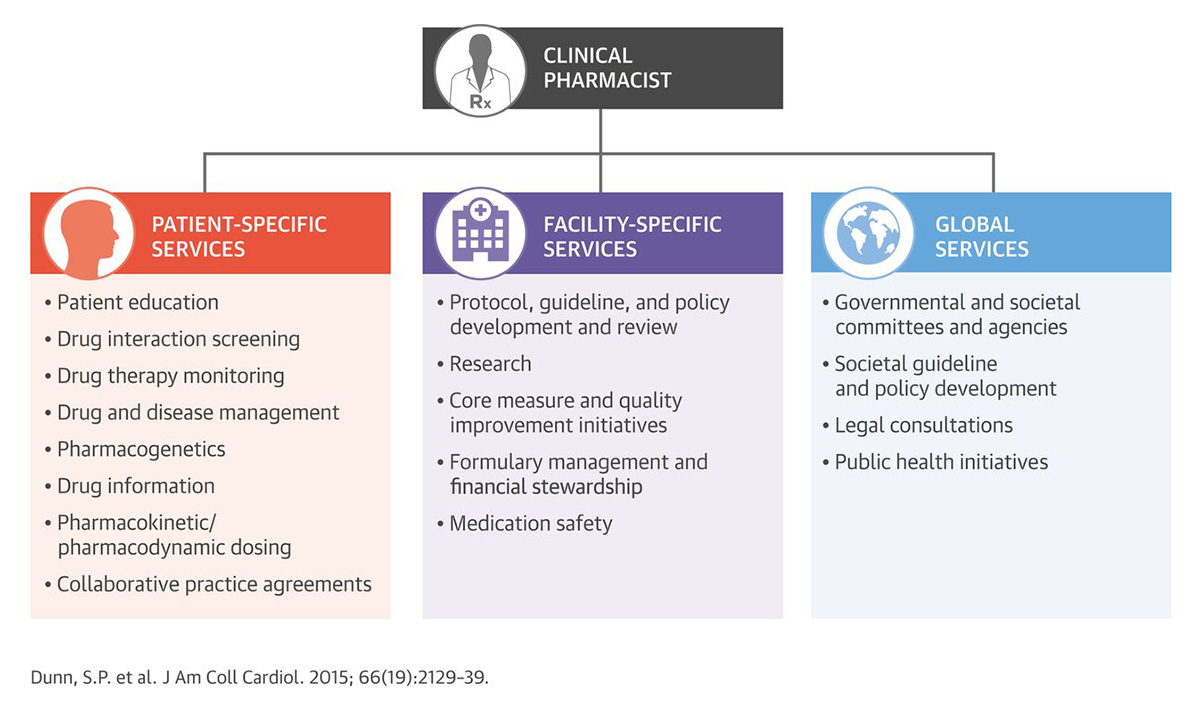Feature | Summarizing the Role of the Clinical Pharmacist in Cardiovascular Disease Care

In November, a task force of physicians and pharmacists from the ACC published "The Role of the Clinical Pharmacist in the Care of Patients with Cardiovascular Disease" in the Journal of the American College of Cardiology.
In this document pharmacists are recognized as important yet underutilized members of the cardiovascular care team. Unfortunately, while the ACC supports utilization of team-based care to address the shortage of cardiologists, many cardiologists are still unfamiliar how to best use clinical pharmacists. This paper informs the cardiovascular community what a clinical pharmacist's training and role encompasses.
Training and Certification
Pharmacists earn a Doctor of Pharmacy or PharmD, which requires a minimum of six years of education with two years from undergraduate and four years from pharmacy school training. The American Council for Pharmacy Education (ACPE), the accrediting body for pharmacy schools, emphasizes interprofessional education to prepare students for new models of healthcare such as the Patient-Centered Medical Home. Furthermore, ACPE stresses direct patient care interactions with prescribers during Advanced Pharmacy Practice Experiences when students enter their fourth year.
Clinical pharmacists enroll in postgraduate training completed over one to two years, with the second (PGY2) focusing on a specialty such as cardiology. Only approximately 25 percent of pharmacy students decide to complete residencies. Alternatively, pharmacists may complete a fellowship instead of a PGY2. Pharmacy fellowships prepare learners to be independent researchers and emphasize the scientific research progress.
Finally, pharmacists are able to obtain certification from pharmacist-only and multidisciplinary organizations. In their own field, pharmacists are recognized with advanced certification through the Board of Pharmacy Specialties in the areas of nuclear, nutrition support, oncology, pharmacotherapy, ambulatory care, pediatrics and critical care.
Multidisciplinary organizations also certify pharmacists in the fields of diabetes, anticoagulation, lipids and asthma management. Clinical pharmacists distinguish themselves with additional training and certification to aid in the medication management complex pharmacotherapy.
Clinical Activities
The role of pharmacists is broken down into three categories: patient-specific, facility-specific and global services. Figure 1 (below) summarizes the various aspects of care that clinical pharmacists impact.
Many clinicians are unaware of the diverse role that pharmacists play in healthcare. Pharmacists continue to add to the already robust evidence regarding their benefit to cardiovascular risk management. Patients benefit when pharmacists practice with the cardiovascular care team or independently through the use collaborative practice agreements (CPAs), which are available in 46 states and the District of Columbia.
These agreements allow pharmacist the freedom to start or stop medications and order labs for drug therapy management. Collaborative practice agreements have been shown to improve cardiovascular risk management in both primary care and cardiology practices.
Readmissions for heart failure are also decreased when a clinical pharmacist is added to the outpatient and inpatient care team. While the evidence and legal system allow for implementation of CPA, the inability of pharmacists to adequately obtain reimbursement limits their use.
Pharmacist training and roles continue to emphasize direct patient care especially with new practice models, such as Patient-Centered Medical Homes and Accountable Care Organizations, utilizing interprofessional teams to provide heightened quality of care.
Team-based care involves a diverse group of providers including physicians, clinical nurses and physician assistants. However, when building a cardiovascular care team, consider making a clinical pharmacist a part of your team.
This article was authored by John B. Bucheit, PharmD, BCACP, CDE.


